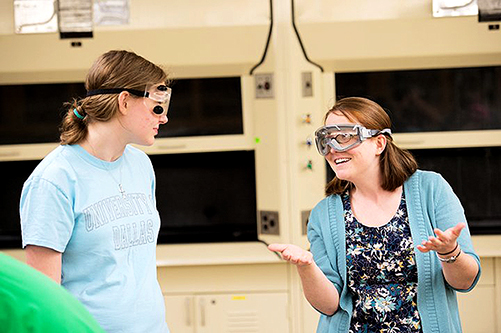 Menu
Menu

The University of Dallas has received a $300,000 grant from the W.M. Keck Foundation to purchase a scanning electron microscope (SEM), which will support teaching and research for both faculty and students at the nanoscale (10-9 m) level.
Associate Professor of Chemistry Ellen Steinmiller, Ph.D., Assistant Professor of Biology Deanna Soper, Ph.D., and Professor of Physics Sally Hicks, Ph.D., have mapped out specific plans for the use of the SEM in their research and teaching. They expect the installation of the SEM to enhance currently offered courses such as an interdisciplinary laboratory course, to create new courses such as a materials science course, and to augment research projects in UD’s science departments.
The need for the SEM first became apparent in 2015 in the midst of a one-credit laboratory course (Integrated Science Lab: The Color Blue) investigating the structures responsible for the shades of blue found in nature for which no known pigments exist. This course was designed by biology, chemistry and physics faculty in order to teach students the value of investigating scientific questions in a cross-disciplinary way.
At the time, students were not able to make measurements at the nanoscale level — the dimension necessary for studying the structures leading to the beautiful blues seen, for example, in morpho butterfly wings. With this new SEM, in future incarnations of this course, they will be able to do so. Other courses and laboratories — both existing and new — will also utilize the SEM.
As Steinmiller explained, she is a materials chemist and studies the architecture of materials synthesized in the lab. Her research focuses on analyzing how form and function are inextricably linked and depend on one another. An SEM is essential because she can see the shapes of the metal oxides investigated in her lab.
Meanwhile, Soper studies very small organisms such as insects, snails, and plankton. She studies the male genitalia of insects and snails because this trait is important for males to be successful in mating, which is evolutionarily important. As she explained, the SEM is needed for the detailed images necessary for quantifying structural changes, and such images are not consistently achievable with a regular light microscope. In her marine biology class, she plans to have students investigate plankton because, as in studying insects and snails, light microscopy is insufficient to examine structural details of the organisms.
In the analysis of everything from chromosomes to gunshot residue, the SEM will help to develop students as scientists.
“We’re always training the next generation of scientists,” explained Soper and Steinmiller, neither of whom had the opportunity to work with an SEM until graduate school. “Whether they’re going into graduate school, medical school or industry — they’ll be leaps and bounds ahead of others by having already had experience with an SEM.”
The SEM will enhance the student experience in UD’s labs and research. It has the potential to attract new faculty because the SEM will open new avenues for research and teaching.
“The opportunities for the future are quite exciting, as the SEM makes the possibility of bringing a condensed matter or optical physicist to the department much more likely,” Hicks added.
Similarly, prospective students may be intrigued by the possibility of learning high-level microscopy skills at the undergraduate level. The SEM is expected to be delivered and installed during the fall and will be available for regular student use in the spring 2019 semester.
Discover more about studying biology, chemistry or physics at UD.